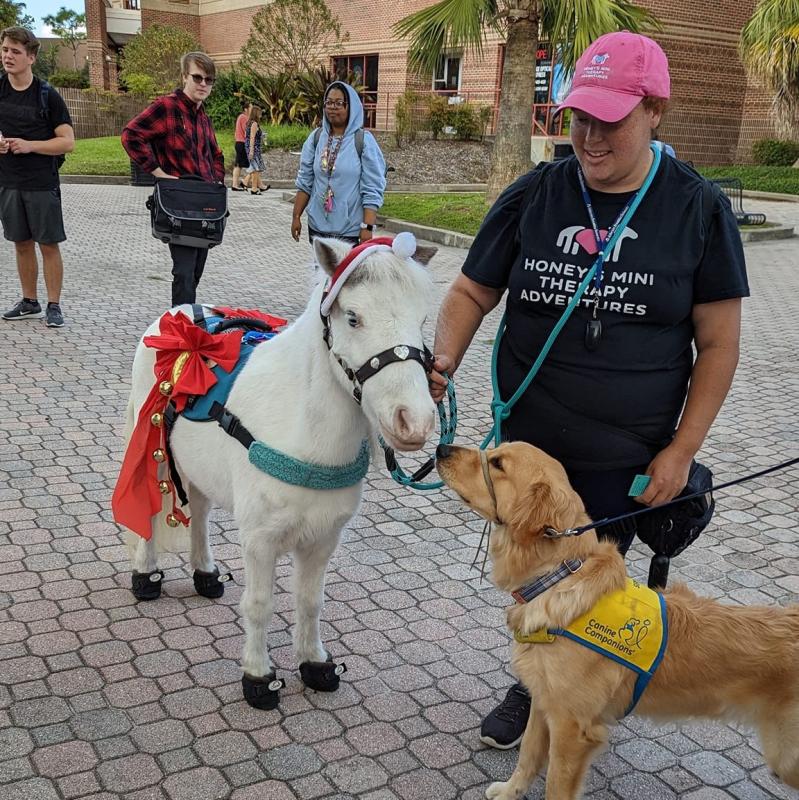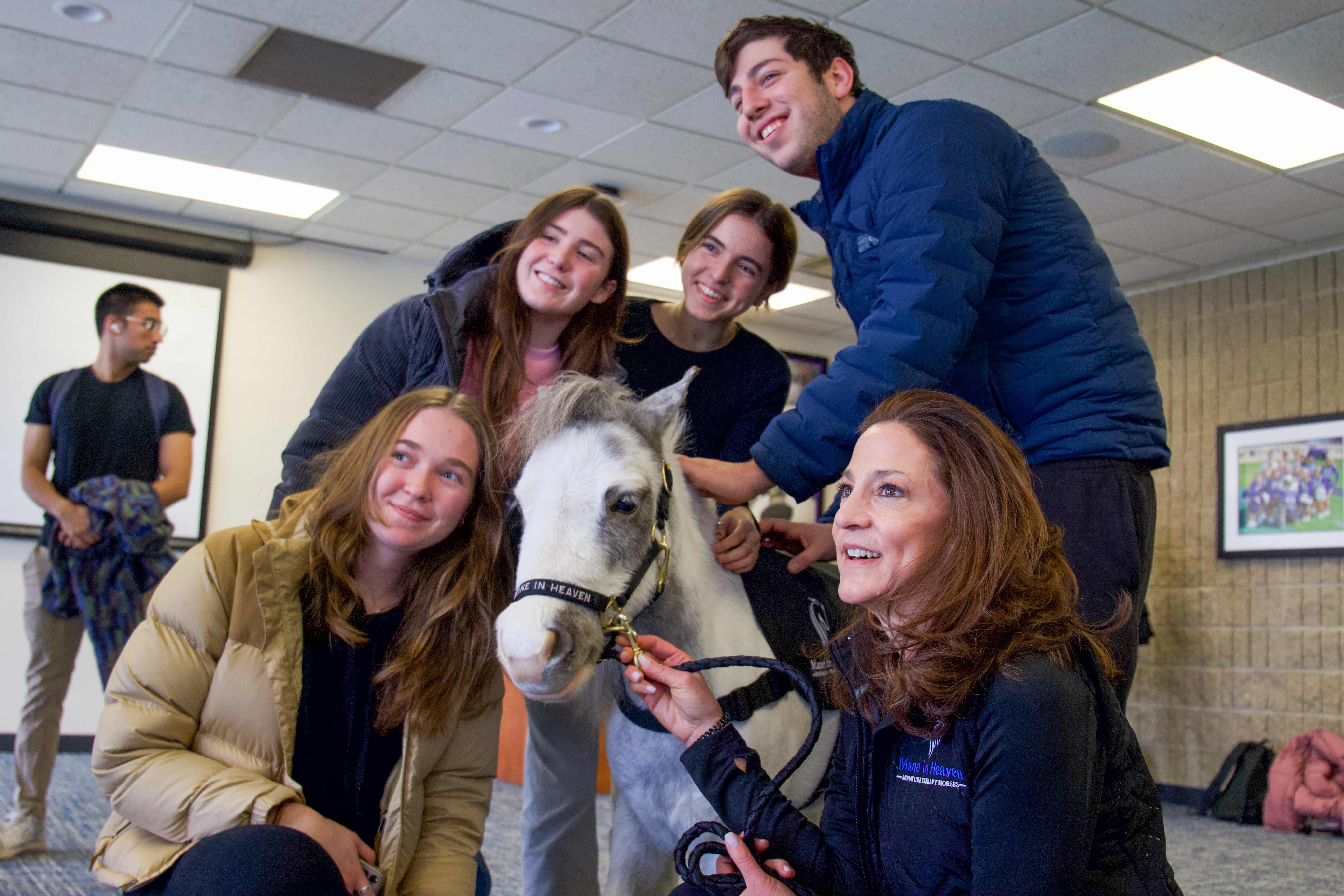You have /5 articles left.
Sign up for a free account or log in.
Move over, therapy dogs—there’s a new stress relief animal on the block: mini horses.
Colleges invite mini horses trained to provide emotional support onto campus during stressful times in the term, like finals week or midterms, to provide a fun stress relief experience for its campus community.
What’s the need: During finals week each semester, the University of Central Florida receives higher levels of mental health calls to its police department, a consequence of increased stress before exams.
Using animals as stress relief is a common practice both inside higher education and out. Interacting with animals decreases stress-related hormone cortisol and lowers a person’s blood pressure, according to the National Institutes of Health. As an engagement tool, animals reduce feelings of loneliness and increase feelings of social support, which can translate into a happier campus environment.
“Often during those high stress times, we hear students say, ‘I wish I had my dog here’ … because they’re used to their family pet being that therapeutic support for them at home,” says Ryan McCombs, director of the Purdue Fort Wayne Disability Access Center.
At Northwestern University, students can often be competitive or high achievers, creating a tense campus culture or one that does not stop to take breaks, says Tracey Gibson-Jackson, director of student organizations and activities. “We center all of our programs around wellness, and we try to identify ways to get students to take a break,” she adds.
 A horse-sized hole: Bringing therapy animals to college campuses is not a new trend, but it’s one that’s picked up momentum since the start of the pandemic and a growing conversation around students’ mental health. Dogs are the most common, but horses can achieve the same stress relief goals—with some different outcomes.
A horse-sized hole: Bringing therapy animals to college campuses is not a new trend, but it’s one that’s picked up momentum since the start of the pandemic and a growing conversation around students’ mental health. Dogs are the most common, but horses can achieve the same stress relief goals—with some different outcomes.
For one, some students who grew up in urban settings have never interacted with a horse before, making it a valuable learning opportunity, McCombs explains. Students may be afraid of dogs, or allergic, as well.
Similar to a large dog, miniature horses stand around 34 to 38 inches tall, but they can live for 25 to 35 years, lengthening their careers as a service animal. The horses are well trained and conditioned to be around people, as well, Gibson-Jackson says.
Horsing around on campus: UCF elected to bring therapy horses to campus because one staff member was familiar with a local organization, Honey’s Mini Therapy Adventures, which has brought miniature horses into hospitals and nursing homes for emotional care.
“We reached out in the hope that they’d want to try reaching a new audience on a college campus. And they did!” says Amanda Sellers, UCF’s public information officer.
Northwestern has hosted mini therapy horses for 10 years, Gibson-Jackson says, and will bring horses to campus in May for the inauguration of its new president, Michael Schill.
Purdue University, Fort Wayne, will host its first therapy horses on campus later this month. While the university has hosted therapy dogs for three years during finals week or other stressful points of the semester, this year it’s adding horses, McCombs says.
The horses hang out in a central location, maybe for a few hours, and students can stop, pet them and get that mood boost they need to focus on their academics.
UCF has promoted the horses’ visit on social media and then given live updates of the horses’ locations on Twitter while they were on campus, walking the equines on a loop and stopping at high-traffic areas to allow students to pet them.
On April 24, the horses will be visiting the UCF Downtown campus in the morning and then trotting over to the main campus in the afternoon.
At Fort Wayne, the horses will be available to community members in the student union.
During their visit, the horses wear specific gear, including mini boots to cover their hooves and protect floors, a blanket or vest to denote the equine is a comfort animal or therapy animal, and a little bag over their tail in case of any accidents.
“You’d be so surprised to see how excited students get for little horses with sneakers,” Gibson-Jackson says.
 High praise for horses: Students regularly inquire about the horses, and the providing company says UCF is one of their favorite places to visit, Sellers says.
High praise for horses: Students regularly inquire about the horses, and the providing company says UCF is one of their favorite places to visit, Sellers says.
“We heard so many students talking about how meeting the mini horses had made their whole week. One even said that she completely forgot about her finals week stress during the five minutes she was petting them,” Sellers adds.
Therapy horses are a unique programming that serve all kinds of students well, Gibson-Jackson says. Whether a student is an introvert with sensory issues or an extrovert who loves stimulation, the animals “hit all touch points” and are inclusive.
“That’s why we keep bringing them back—they disarm students … bring out all the stress and the tension,” Gibson-Jackson says.
At Fort Wayne, McCombs hopes the therapy horses remind students that the university is there for them and wants to support them and their well-being. “This is just another way for students to make sure that we notice [their mental health], and it’s a way for us to assist them with managing that.”
What’s a unique effort to promote student wellness on your campus? Tell us about it.




